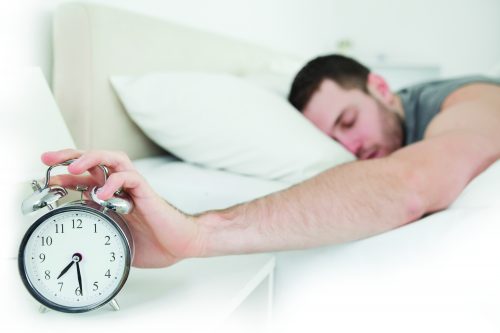
Working shifts can be demanding on the body and mind. One thing which is often compromised is healthy eating — it can be just too hard! HFG nutritionist Claire Turnbull and sleep specialist Dr Alex Bartle have tips on how to cope when you’re working odd hours.
What does shift work do to our bodies?
Whether you work in health care, transportation, emergency services, hospitality or manufacturing, if you’re a shift worker you’ll know that it is tough on your body and mind.
Working irregular hours can undoubtedly have a negative impact on the way you eat, sleep and exercise. From a health and wellness perspective, fatigue and tiredness are big issues for shift workers. Fatigue and tiredness can lead to safety issues in the workplace, making mistakes at work and can have an impact on your home life, too.
There’s also a raft of health issues which can stem from being tired and run down, including lowered immunity, depression and anxiety.
Gastrointestinal (gut) disorders and digestion issues are other common complaints of those who work shifts. The human body naturally has what is called a circadian rhythm; this is a 24-hour cycle which regulates sleeping, waking, digestion, hormones, body temperatures, blood pressure and many other important body functions. When you work shifts, this rhythm is disturbed and issues with digestion such as indigestion, heartburn or stomach pains can result.
Shift workers may have an increased risk of heart disease, some cancers and having accidents as a result of reduced alertness and tiredness.
How shift work can sabotage healthy eating
Working shifts can mean that your eating patterns are irregular. It can be hard to establish a good eating routine when your hours are all over the place.
Sleep disruption and tiredness can also have an impact on the production of the hormones leptin and ghrelin, which can affect your appetite and sometimes make you feel hungrier. What’s more, it has been shown that fatigue reduces your motivation to exercise. These factors, combined with limited access to healthy food, can be a recipe for disaster.
Make an eating plan
Regardless of your pattern, the best thing you can possibly do is to make time each week to look at how to organise your food around your shifts. Use this to help plan your meals and shopping list. If you work irregular shifts this will be even more important as without a plan, you may end up missing meals and snacks or grabbing unhealthy food on the go.
What to eat when
Think about what meals and snacks your body needs in a 24-hour period. Then you can figure out what you’ll need to take to work, and how to eat in the order that works best for you and your shifts.
In a 24-hour period, your body needs:
- ONE breakfast-style meal such as porridge, cereal or eggs or beans with wholegrain toast.
- ONE light meal, including some veges, healthy carbohydrate and lean protein, such as a wholegrain bread sandwich with lean meat, fish or egg and salad.
- ONE main meal such as grilled fish or chicken with roasted kumara and salad.
- ONE OR TWO small snacks such as fruit and low-fat yoghurt or a banana and glass of low-fat milk.
You can choose the order to eat these in. If you are working night shifts you may find it helpful to have your main, most substantial meal of the day before you go to work. Throughout the night it can be helpful to have light meals and snacks which have a combination of slowly absorbed (low GI) carbohydrate-rich foods and protein. These will help supply your body the fuel it needs throughout the night without overloading your digestive system. Avoiding foods high in sugar and fat through the night is advisable too, as they can also upset your gut.
When you have finished your night shift, a small, light snack can be helpful before you go to sleep so you don’t wake up halfway through your daytime sleep because you are hungry.
Shift work, food and sleep
Going to bed on a full stomach is not a great idea, as your digestive system slows down when you are sleeping, which can interfere with the quality of your sleep and increase the likelihood of constipation. Try having your normal evening meal a little earlier or if you do need to eat closer to your bedtime, keep to a lighter, smaller meal.
Stimulants such as caffeine also have an impact on your sleep. Caffeine takes a long time to break down and be cleared from your body. If you have a cup of coffee at 8am, roughly six hours later around 25 per cent of the caffeine will still be in your system.
So what does this mean for shift workers? If you do choose to have caffeinated drinks, try to have them earlier on in your shift. This is likely to have the desired effect of increasing your concentration and alertness, while also allowing the caffeine to start clearing from your system while you work. If you have too much caffeine too close to your bedtime, even though you may fall asleep, the quality of your sleep will be affected and you may not feel properly rested. If you work night shifts, the quality of your sleep maybe already be compromised because you have to sleep during the day.
Great sleep tips for shift workers
- Sleep as soon as possible after you have finished your shift.
- If you have worked a night shift, avoid exposing your eyes to the morning light on the way home — you can wear sunglasses.
- Try to have one block of sleep only after working a long shift. If you do need an extra nap later in the day, keep it to around 20 minutes.
- Use black-out curtaining, eye shades and ear plugs to reduce the likelihood of any disturbance when you are sleeping.
- Disconnect your landline or change the settings so that you don’t hear it ring. Turn your mobile to silent.
- If possible, avoid overdoing caffeinated drinks at work.
- You may find you need sedatives or sleeping tablets to help you sleep. This is best discussed with your GP.
- Talk to your family or the people you live with about your need for sleep and explain how your sleep patterns will work so they can support you.
- After you have finished a shift and had a sleep, try to spend some time outside and expose your skin and eyes to sunlight. Exposing your skin to light is important to help your body to make vitamin D and exposing your eyes to light helps regulate the hormones serotonin and melatonin which have an impact on your mood and how well you sleep.
www.healthyfood.com










